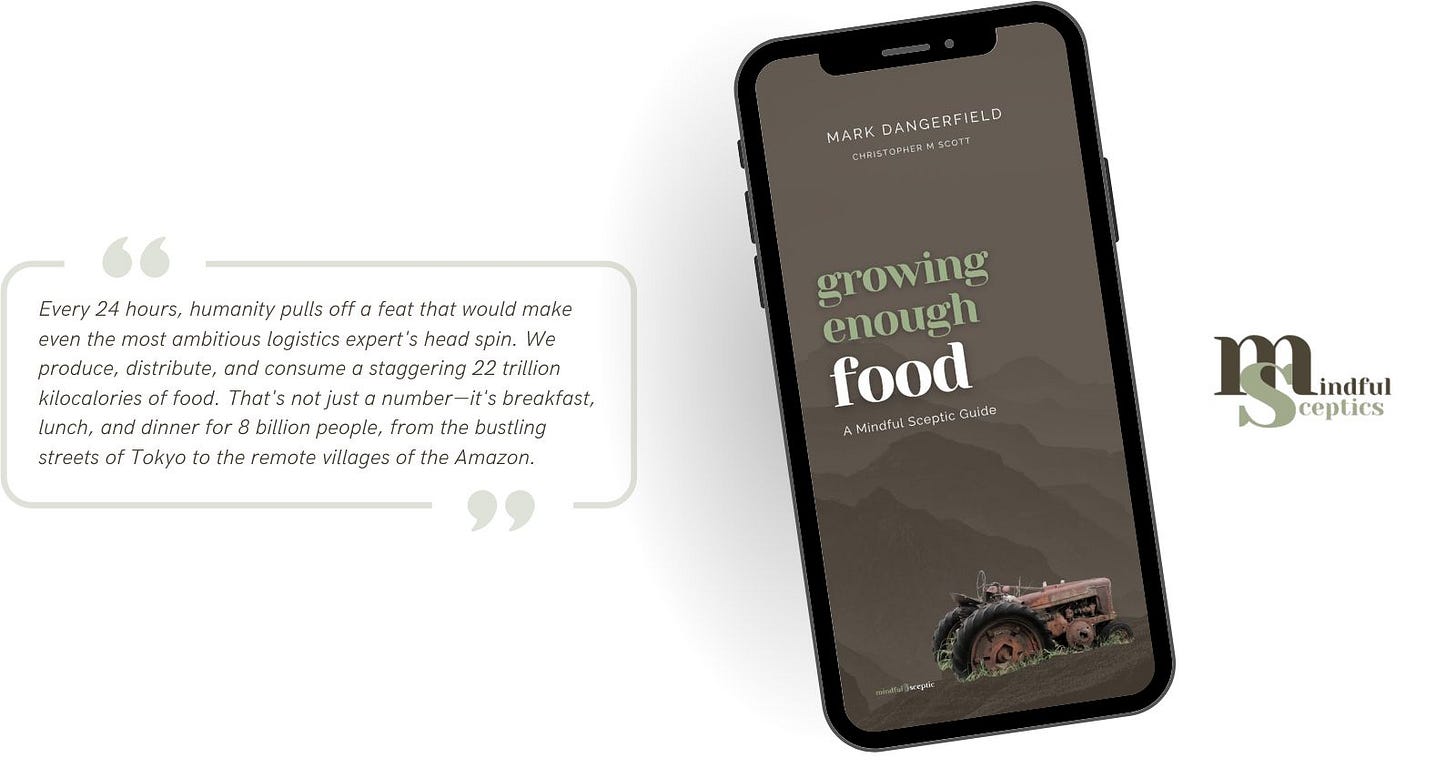Growing Enough Food | A Mindful Sceptic Guide
Every development conference talks about "feeding the world." Agricultural scientists promise that technology will solve hunger. Environmental groups blame farming for destroying the planet. Politicians call for increased yields to meet growing demand.
But what if the entire "food shortage" narrative misses the fundamental reality? What if we already grow enough food to feed 11 billion people? What if the real challenge isn't production, but the biophysical constraints of sustaining energy-intensive agriculture on a finite planet?
What does all that growth cost?
About the Book
Growing Enough Food takes aim at one of the most persistent myths in agricultural policy… that feeding the world is simply a matter of more tonnes per hectare. John Mark Dangerfield and Christopher M. Scott reveal how yield obsession undermines ecological health, distorts economic signals, and disconnects us from what food systems are meant to do.
From industrial monocultures to regenerative agriculture, they trace the unintended consequences of trying to outgrow scarcity. The book doesn't argue against productivity for that would be foolish. Instead, it argues for systems thinking, for knowing not just how much we grow, but how that growth affects land, livelihoods and long-term security.
This guide helps readers understand why the food debate is stuck and how to think their way out.
Why Read This Book?
You’ll understand why more yield doesn’t guarantee better outcomes
You’ll see how food policy often sacrifices nutrition and soil for numbers
You’ll gain tools to interrogate agricultural reform beyond slogans
You’ll sharpen your scepticism about “feeding the world” rhetoric
Who It’s For
This guide is for:
Farmers, policy professionals, environmental thinkers and health advocates
Readers who want a grounded, systems-based view of agriculture
Sceptics of both agribusiness optimism and romanticised organics
It’s not for:
Those seeking simplistic heroes, villains, or silver bullets
Key Themes
The hidden costs of yield-focused agriculture
Why nutrition, soil and culture matter as much as calories
How to reframe food security as systems health
A Taste from Inside
"We are not feeding the world. We are feeding markets — and markets don’t eat."
"A high-yield crop in a dead soil is not a success story. It’s a warning."
"Food security built on soil insecurity is a house on sand."
"More yield per hectare is meaningless if each hectare becomes less viable year by year."
"Calories are not nutrition, and crops are not meals."
About the Authors
Dr John Mark Dangerfield writes for sceptical minds and curious professionals. With an academic and professional background in ecology, policy, and commerce, he brings systems thinking to real-world problems. Christopher M. Scott is a restoration ecologist and bush regeneration practitioner with a lifelong sceptical eye on environmental orthodoxy. When not restoring landscapes or growing plants in his nursery, he’s digging into the science of nutrition, health, and ecological resilience.
"Every 24 hours, humanity produces 22 trillion kilocalories of food. That's not just a number. It's a daily miracle. But it's also an energy paradox because we now use more energy to produce food than the food contains." Mark Dangerfield
This book is part of their Mindful Sceptic Guides series, which thinks deeper so you don’t have to shout louder.
Ready to Read?
Not Ready to Buy?
Subscribe for free to the Mindful Sceptic Newsletter for weekly essays that think as hard as you do.


